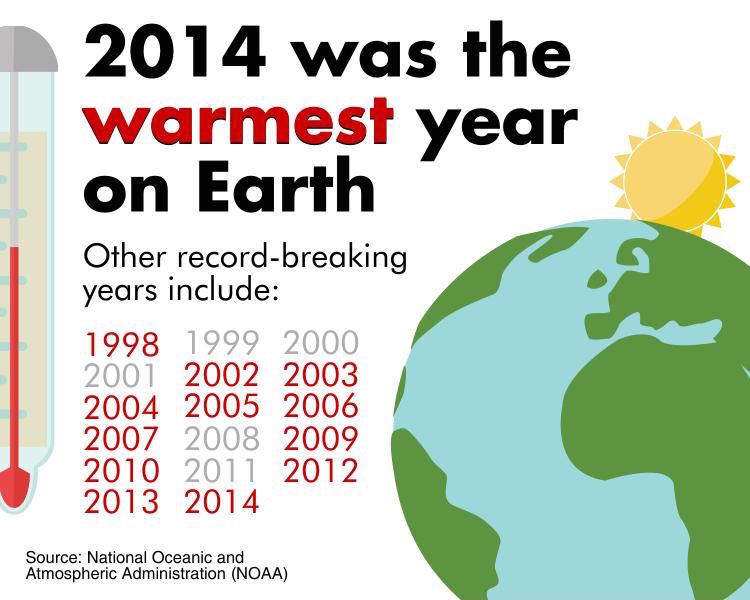Record-setting warmth continues
Infographic: Richard Martinez/Iowa State Daily
The year 2014 ranked as the warmest year on earth.
February 2, 2015
Last year was the hottest year on record, according to reports by NASA and the National Oceanic and Atmospheric Administration.
The previous record was held by both 2005 and 2010. According to NOAA, the average global temperature was 59.24 degrees fahrenheit, which is 1.24 degrees above the 20th century average.
“The simple explanation why the planet is getting warmer is that carbon dioxide is a greenhouse gas and it’s part of the radiative balance,” said Alan Wanamaker, professor of meteorology. “So what happens is more energy coming from the sun stays in the planet.”
This rise in temperature is consistent with what scientists have been seeing since the rise of the Industrial Revolution. Since the start of the revolution, the temperature has been rising exponentially, Wanamaker said.
“In some sense, the talk of lowering [carbon dioxide] in the atmosphere as a group of citizens on the planet has not gone far. Now there have been some events linked to economics. …When companies can benefit from climate change, [maybe] we’ll see action,” Wanamaker said.
Wanamaker said that the temperature will not decrease if greenhouse gasses are reduced in the atmosphere, but the temperature will start to stabilize.
“It’s going to be along time before we see the benefit of curbing emissions and I think that’s an obstacle,” Wanamaker said. “It’s unfortunate because I think a lot of people say, ‘I’m not gonna be here in a 100 years, so why should it matter.”
The counter argument to that is, well maybe your family members, or your children, or your children’s children will be here, and so maybe we should do it for them.”
While the temperature may be rising globally, in Iowa, it has stayed relatively the same since the 1930s, said Harry Hillaker, Iowa Department of Agriculture climatologist. According to the Iowa Department of Agriculture, Iowa’s average temperature was 45.4 degrees last year, 2.7 degrees below the state average.
“[Right now], corn has an ideal climate in Iowa,” Hillaker said.
This “ideal climate” could be changing, according to the NOAA reports that show a steady rise in global temperatures since the 1920s.
“Midwest weather hasn’t cooperated with the models,” Hillaker said, but hypothetically if Iowa’s temperature began to rise, “we could have to plant and harvest earlier.”
It is not the temperature that would cause farmers to plant their crops earlier, it is the dryness that the rise in temperatures could cause. The most important months for farmers are July and August, Hillaker said. If temperatures are higher in those two months, especially if they are in the 100s, there could be droughts, which could prevent the crops from growing.
Wetter months before July and August help keep temperatures down, Hillaker said.
“It’s hard to say how things could turn out,” Hillaker said, “Computers have a hard time predicting day to day rainfall, let alone years in advance.”
The issue of crop protection has gained the attention of the United Nations. In their biennial meeting earlier this month, members of the United Nations Food and Agriculture Organization emphasized the need for more genetically advanced crops, according to a report by the UN.
“In a warmer world with harsher, more variable weather, plants and animals raised for food will need to have the biological capacity to adapt more quickly than ever before,” said Maria Helena Semedo, deputy director of the FAO. “Preventing further losses of agricultural genetic resources and diverting more attention to studying them and their potential will boost humankind’s ability to adapt to climate change.”
Plans to stop the rise in temperatures have already been put in place. Last year, the Environmental Protection Agency announced its Clean Power Plan, which plans to reduce carbon dioxide emissions from power plants by 30 percent by 2030, and the U.S. and China reached agreements to reduce their greenhouse gas emissions.
“What’s surprising is that anyone is surprised that 2014 was the hottest year on record. The science has been screaming at us for a long, long time,” said Secretary of State John Kerry in a statement. “The question is when and how the world will respond. Ambitious, concrete action is the only path forward that leads anywhere worth going.”







